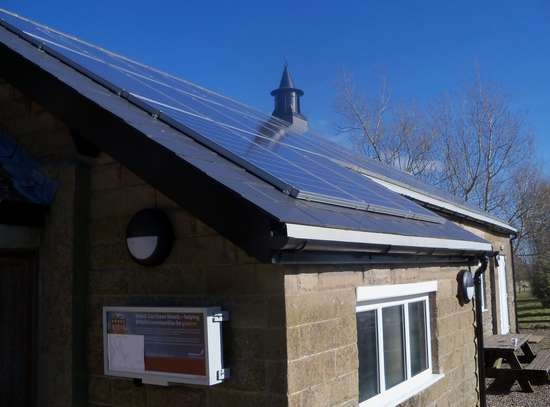Solar-powered village halls feasibility project update
26th Jan 2022

CAN is working in partnership with the Rural Design Centre (RDC) and the National Innovation Centre for Rural Enterprise (NICRE) to support village halls and other community buildings in rural Northumberland on the journey towards net zero, saving on energy bills and becoming more energy resilient.
Phase one feasibility work investigating the potential installation of solar panels and related battery storage to 19 community buildings in Northumberland was concluded in October 2021. Fully funded with grant from the Rural Community Energy Fund (RCEF), this feasibility work was carried out by HE Servicing of Hexham and Aquatera, based in Orkney.
19 community buildings were surveyed as part of the project in 12 communities. Roof-mounted solar panels were demonstrated to be feasible on all buildings from an energy production and carbon reduction point of view. Financial feasibility varied significantly with payback periods varying from 11 years to in excess of 20 years.
From a financial and energy management point of view, battery storage would make the key difference in each case. This would enable each venue to maximise the benefit from the energy generated and would also provide a critical energy reserve in the event of any future power cuts to the national grid – especially critical for those venues which operate as Emergency Rest Centres in times of crisis (such as that experienced recently in the aftermath of Storm Arwen).
However, battery storage adds additional cost as well as complexity to each installation. Typically, batteries double the installation costs – and extend the payback period.
Funding bid submitted
Working with the RDC and NICRE, we have recently submitted a bid to fund the necessary stage 2 feasibility work required to take such installations forward. If successful, this would pay for a number of essential pre-development activities including:
- Roof surveys and full design work for each building installation.
- Grid connection agreements and full planning applications for all building installations.
- Full financial plans (revenue and capital).
- Business planning for a potential new community energy vehicle to raise the required finance and subsequently manage the battery installations.
- Initial survey work for a possible second wave of village halls/community-owned assets.
This is an exciting project which could lead the way in bringing forward investment of this nature in remote rural locations – as well as others.
We will hear if the current bid has been successful in early March and, if so, will aim to complete all stage 2 feasibility work by December 2022. We are already in discussion with funders regarding potential capital funding to assist the installation process.
Village halls encouraged to get involved
We are keen to hear from other village halls that may be interested to find out more and, potentially, be included in the next phase of feasibility work. If you would like to find out more, please contact andydean@ca-north.org.uk